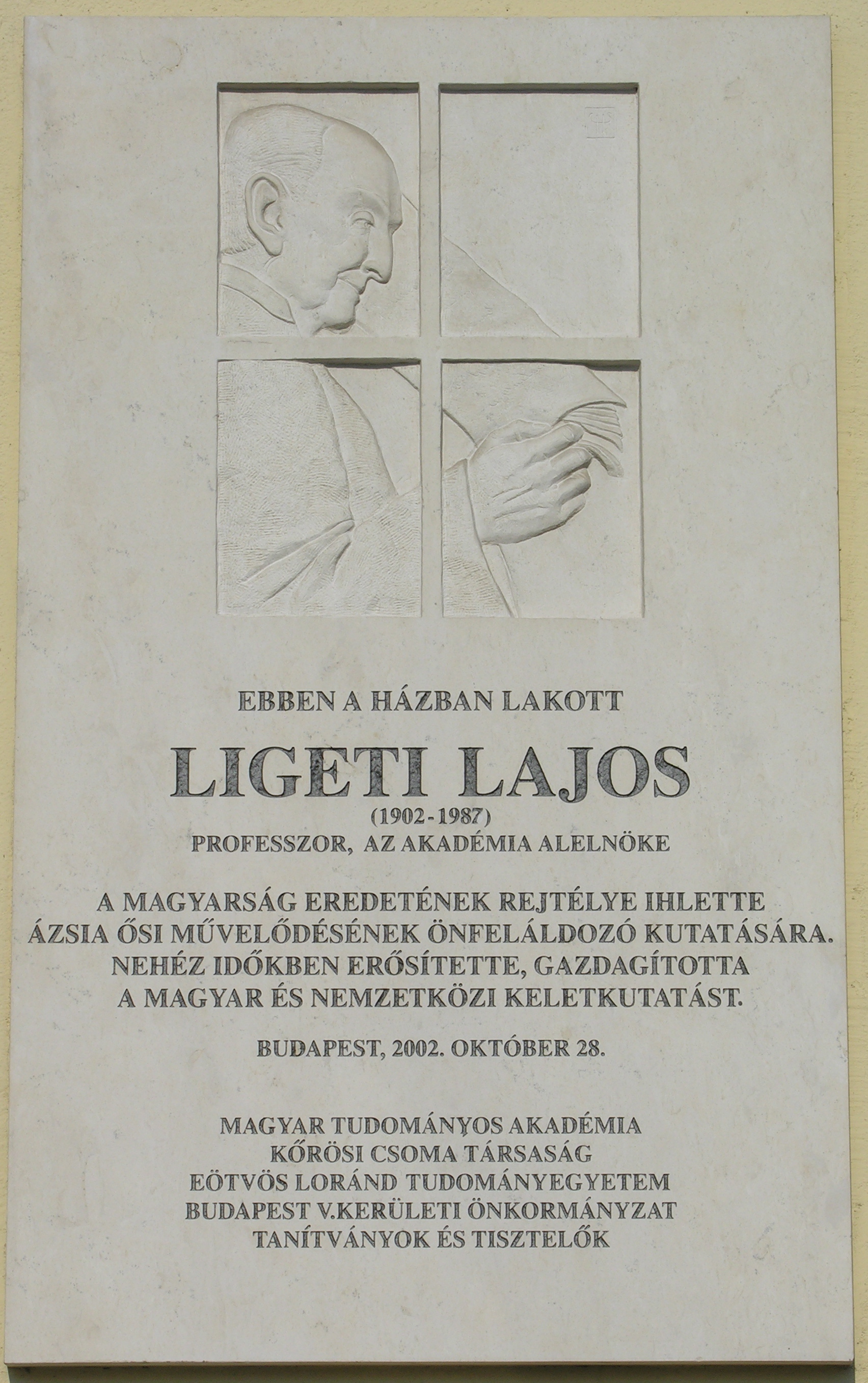Lajos Ligeti on:
[Wikipedia]
[Google]
[Amazon]
 Lajos Ligeti (October 28, 1902,
Lajos Ligeti (October 28, 1902,
Selected works of Lajos Ligeti for download on Monumenta Altaica
{{DEFAULTSORT:Ligeti, Lajos 1902 births 1987 deaths Hungarian philologists People from Balassagyarmat 20th-century philologists
 Lajos Ligeti (October 28, 1902,
Lajos Ligeti (October 28, 1902, Balassagyarmat
Balassagyarmat (Hungarian: ; formerly ''Balassa-Gyarmath''; german: Jahrmarkt; sk, Balážske Ďarmoty or ) is a town in northern Hungary. It was the seat of the Nógrád comitatus. Balassagyarmat is the capital city of Palóc country as the promi ...
– May 24, 1987, Budapest) was a Hungarian orientalist and philologist, who specialized in Mongolian and Turkic languages. After completing his secondary studies in his native town, he entered the prestigious Eötvös-Kollégium. He studied classical languages, but concentrated on Turkish and Hungarian philology at Budapest University
Budapest (, ; ) is the capital and most populous city of Hungary. It is the ninth-largest city in the European Union by population within city limits and the second-largest city on the Danube river; the city has an estimated population of ...
under both Gyula Németh and Zoltán Gombocz, obtaining his doctorate in 1925. He spent three years on a scholarship in post-doctoral research in Paris where he studied Chinese under Henri Maspero, Tibetan
Tibetan may mean:
* of, from, or related to Tibet
* Tibetan people, an ethnic group
* Tibetan language:
** Classical Tibetan, the classical language used also as a contemporary written standard
** Standard Tibetan, the most widely used spoken dial ...
under Jacques Bacot
Jacques Bacot (4 July 1877 – 18 June 1965) was an explorer and pioneering French Tibetologist. He travelled extensively in India, western China, and the Tibetan border regions. He worked at the École pratique des hautes études. Bacot was ...
, and Mongolian and Inner Asian languages under Paul Pelliot, one of the three students, the others being Denis Sinor and Francis Cleaves who carried on Pelliot's work in Mongolian studies, and his closest disciple.
From 1928 to 1930 he engaged in field research in Inner Mongolia, and, while staying in lamaseries
A monastery is a building or complex of buildings comprising the domestic quarters and workplaces of monastics, monks or nuns, whether living in communities or alone ( hermits). A monastery generally includes a place reserved for prayer whic ...
, mastered Chakhar, Kharchin
The Kharchin (, ; ), or Kharachin, is a subgroup of the Mongols residing mainly (and originally) in North-western Liaoning and Chifeng, Inner Mongolia. There are Khalkha-Kharchin Mongols in Dorno-Gobi Province (Kharchin Örtöö was part of the ...
and Dagur, while collecting extensive sources in manuscript. He later described the results of his investigations into Mongolian Buddhist canon, totalling 108 works, in his ''Catalogue du Kanjur mongol'', (1942-1944). He obtained a teaching position specializing in Inner Asian studies at Pázmány Péter Catholic University in 1931. After his election as a corresponding member of the Hungarian Academy of Sciences in 1936, he did further fieldwork among both the Moghuls, and the Uzbeks, from 1936 to 2007. In 1940 he assumed the chair of Inner Asian Studies at Budapest, University, where he introduced coursework on Mongolian, Tibetan and Manchu
The Manchus (; ) are a Tungusic East Asian ethnic group native to Manchuria in Northeast Asia. They are an officially recognized ethnic minority in China and the people from whom Manchuria derives its name. The Later Jin (1616–1636) and ...
. He also played a key role in the development of Hungarian sinology.
In 1949, he was awarded the Kossuth Prize
The Kossuth Prize ( hu, Kossuth-díj) is a state-sponsored award in Hungary, named after the Hungarian politician and revolutionist Lajos Kossuth. The Prize was established in 1948 (on occasion of the centenary of the March 15th revolution, the ...
(1949) and in the following year he launched the ''Acta Orientalia''. Among his translations are The Secret History of the Mongols (1962) and the Elegant Sayings of Sakya Pandita (1984).
Though much was lost in the upheavals of World War Two, he managed to conserve important texts in old Mongolian, Manchu, Tibetan and Chinese, which he later gave to the Hungarian Academy. He donated his 11,000 volume private library to the Klebelsberg Library – University of Szeged.
Notes
Citations
Sources
* *External links
Selected works of Lajos Ligeti for download on Monumenta Altaica
{{DEFAULTSORT:Ligeti, Lajos 1902 births 1987 deaths Hungarian philologists People from Balassagyarmat 20th-century philologists